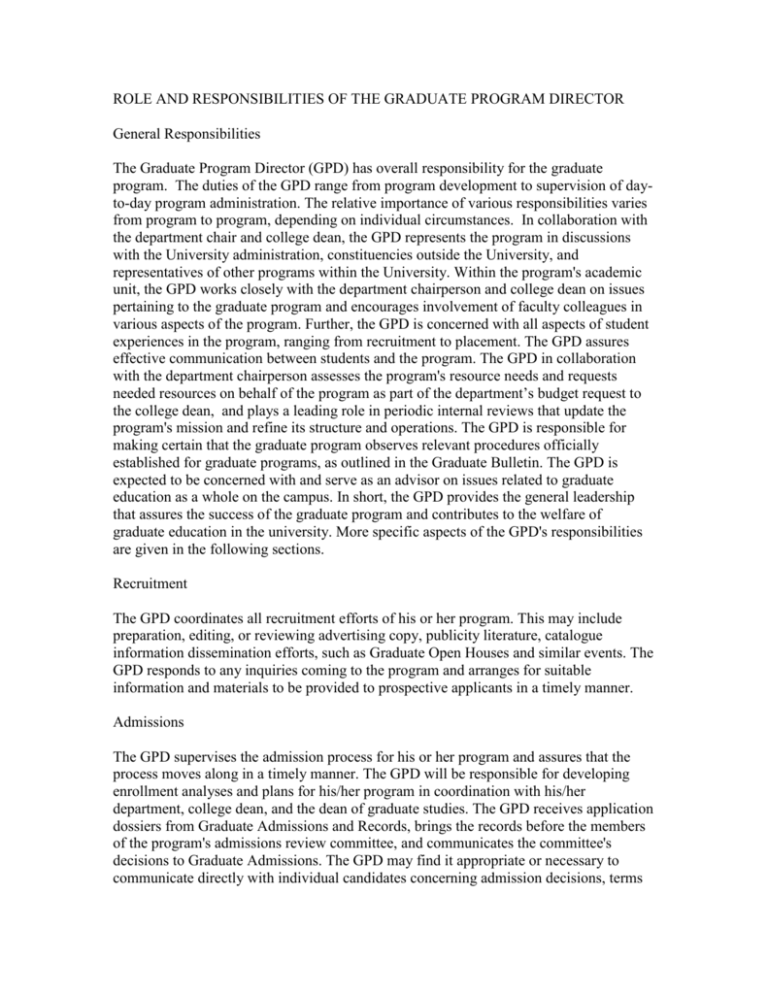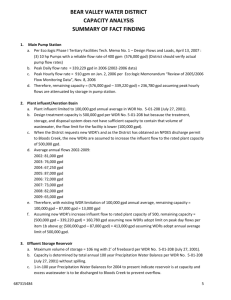Roles and Responsibilities of the Graduate Program Director
advertisement

ROLE AND RESPONSIBILITIES OF THE GRADUATE PROGRAM DIRECTOR General Responsibilities The Graduate Program Director (GPD) has overall responsibility for the graduate program. The duties of the GPD range from program development to supervision of dayto-day program administration. The relative importance of various responsibilities varies from program to program, depending on individual circumstances. In collaboration with the department chair and college dean, the GPD represents the program in discussions with the University administration, constituencies outside the University, and representatives of other programs within the University. Within the program's academic unit, the GPD works closely with the department chairperson and college dean on issues pertaining to the graduate program and encourages involvement of faculty colleagues in various aspects of the program. Further, the GPD is concerned with all aspects of student experiences in the program, ranging from recruitment to placement. The GPD assures effective communication between students and the program. The GPD in collaboration with the department chairperson assesses the program's resource needs and requests needed resources on behalf of the program as part of the department’s budget request to the college dean, and plays a leading role in periodic internal reviews that update the program's mission and refine its structure and operations. The GPD is responsible for making certain that the graduate program observes relevant procedures officially established for graduate programs, as outlined in the Graduate Bulletin. The GPD is expected to be concerned with and serve as an advisor on issues related to graduate education as a whole on the campus. In short, the GPD provides the general leadership that assures the success of the graduate program and contributes to the welfare of graduate education in the university. More specific aspects of the GPD's responsibilities are given in the following sections. Recruitment The GPD coordinates all recruitment efforts of his or her program. This may include preparation, editing, or reviewing advertising copy, publicity literature, catalogue information dissemination efforts, such as Graduate Open Houses and similar events. The GPD responds to any inquiries coming to the program and arranges for suitable information and materials to be provided to prospective applicants in a timely manner. Admissions The GPD supervises the admission process for his or her program and assures that the process moves along in a timely manner. The GPD will be responsible for developing enrollment analyses and plans for his/her program in coordination with his/her department, college dean, and the dean of graduate studies. The GPD receives application dossiers from Graduate Admissions and Records, brings the records before the members of the program's admissions review committee, and communicates the committee's decisions to Graduate Admissions. The GPD may find it appropriate or necessary to communicate directly with individual candidates concerning admission decisions, terms of acceptance, offers of teaching or research assistantships, or other matters related to the program. When students are to be admitted on a conditional basis (provisional acceptance, probationary acceptance, etc.) the GPD will formulate the stipulations to acceptance in consultation with the Office of Admissions and Records and if appropriate, the Dean of Graduate Studies. Registration The GPD supervises enrollment advising for his or her program, ensuring that students have access to knowledgeable guidance in selecting courses and otherwise fulfilling requirements of the program. The GPD works in cooperation with Graduate Admissions in facilitating the enrollment process for students in his or her program. The GPD approves the admission of any nonmatriculated students to courses in the program, and monitors overall course enrollments and section capacities. Advising and Problem Resolution The GPD monitors the progress of all graduate students in his or her program, ensuring that students make satisfactory progress through the program, and taking whatever action may be appropriate when progress is not satisfactory. In many cases a research director or similar mentor in the program will advise students on routine matters. However, the GPD will have primary responsibility for resolving student problems with registration, courses, assistantships, records, and other such matters, when needed. Graduate Assistantships If the program offers graduate assistantships, the GPD supervises awarding of assistantships. Assignments of duties will be made in consultation with department chairs. The GPD initiates and monitors procedures and paperwork to ensure that recipients receive their stipends in a timely manner. Curriculum The GPD serves as liaison between the program and college and university governance or administration in matters of curriculum development, curriculum revision, changes in program requirements, course changes, and new course proposals. Proposals from the program on these matters must be made with the knowledge and concurrence of the GPD and must be coordinated with and approved by department chairs and college deans and go through appropriate college and university governance bodies. Scheduling and Course Evaluation The GPD supervises scheduling and instructional assignments of the program's offerings, in collaboration with the Chair or Director of the academic unit in which the graduate program may be housed, to ensure that students can progress through their required work in a timely manner. This scheduling work is done within the enrollment management policies of the college housing the graduate program. The GPD also participates in evaluations of instruction in graduate courses in a manner appropriate to the procedures of the program's academic unit (e.g. by periodically reviewing course evaluations for faculty teaching graduate courses). Completion of Degrees or Certificates The GPD reviews the records of all students completing the degree or certificate, and certifies to Graduate Records that all requirements of the program have been met. In those programs that require or offer a thesis, dissertation, or final project or the certificate or degree, the GPD supervises the scheduling and conduct of any final review procedures (thesis defense, dissertation defense, etc.), and by his or her signature gives final program approval to the work before its submissions to the Office of Graduate Studies. Ordinarily the GPD attends each final defense and may be an active member of the student's review committee, if appropriate to the program's procedures. Appointment and Term of Service The program will nominate the GPD, consistent with its governance procedures or those of its associated academic unit. Appointments must be approved by the appropriate college dean and the dean of graduate studies. The normal term of appointment will be three years. Duties generally span the full year. The GPD recognizes his or her responsibility to make certain that there is someone who can provide reliable program information to inquirers during intersession and summers or at other times when he or she is not available. Responsiveness to the Office of Graduate Studies (OGS) From time to time the GPD will be asked to provide data or inform OGS of matters related to the program. In addition, the GPD will be called upon on occasion to consult on broader issues related to graduate education on campus. The GPD will prepare an annual report in June of each year (See Appendix A) that will be shared with the college dean and the dean of graduate studies. Review of the GPD A personnel committee of the program or its associated academic unit will conduct an annual review of the GPD's performance. The graduate program committee within the academic unit (or similar body that works regularly with the GPD) should be consulted in carrying out this review, and may in fact be the body that conducts the review, if consistent with the academic unit's governance procedures. This review may be concurrent with other annual performance reviews (e.g., annual faculty review), but should separately address the GPD's performance as director of the graduate program. The Dean of Graduate Studies may conduct his or her own evaluation of the GPD's performance that draws heavily on the GPD's report and will transmit this evaluation to the collegiate dean for consideration in determining merit awards.








